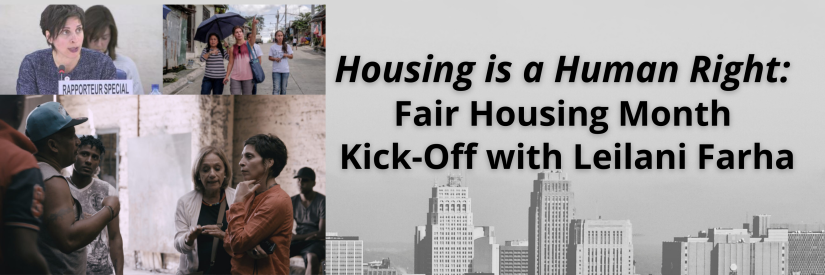‘Housing is a human right’: Lecture highlights global housing issues, displacement
Image via University of Pittsburgh
An advertisement for a Pitt Global Studies Center event with guest speaker Leilani Farha for Pitt’s Fair Housing Month initiatives
April 7, 2022
For Leilani Farha, a Canadian housing advocate, addressing housing issues is an essential part of human rights advocacy.
“Of course, housing is a human right,” Farha said. “And I can say that with complete confidence, because it’s in the Universal Declaration of Human Rights.”
Farha spoke at a public lecture on Wednesday at the Barco Law Building titled, “Using International Law and Institutions to Support Housing as a Human Right.” The lecture was a part of the Global Studies Center’s week-long celebration of National Fair Housing Month. The week featured public lectures, panel discussions, a press conference and a community action dialogue centered around the question of whether fair housing is a human right.
President Lyndon B. Johnson signed the Fair Housing Act in April 1968, which is a landmark civil rights law that made discrimination in housing commerce illegal. The act prohibited discrimination based on race, color, national origin, religion, sex, disability and familiial status. In honor of this legislation, National Fair Housing Month is celebrated every April.
Farha is a licensed lawyer in Canada and former Special Rapporteur for the United Nations from 2014-20, where she focused on issues of fair housing. She is also the global director of The Shift, which is an international organization that focuses on securing housing and ending homelessness.
According to Veronica Dristas, the associate director of the Global Studies Center, Farha was invited to speak at Pitt for National Fair Housing Month for many reasons, including her global advocacy.
“She has been a leading global voice pointing to the dangers of growing financialization of housing,” Dristas said. “She has been forthright and courageous in confronting governments and large corporations to remind them of their human rights obligations under international law and to build awareness and institutional support for the human right to housing.”
Dristas said Farha’s work as a director for The Shift is especially important because she’s building a “movement.”
“She is helping build a movement of community advocates and government leaders at local and national levels to develop new thinking and models for policies that can counter financialization and protect people’s right to secure and decent housing,” Dristas said.
According to Farha, since the pandemic started, she has not been able to work that much outside of her house in Ottawa. But before she came to Pittsburgh this week, she took a trip to Palestine to help those who were displaced on Israeli occupied territory.
As part of her housing advocacy, Farha also starred in a documentary called “Push,” which focuses on the problem of inadequate housing across the globe. This documentary is mainly told through Farha’s perspective, as she discovers large corporate industries taking over places such as Toronto, Harlem, and Notting Hill in London, increasing rent prices and subsequently displacing people from their homes.
According to Farha, many African Americans are being displaced in Harlem because of the neighborhood’s rising cost of living.
Describing a Black man living in Harlem featured in the documentary, Farha said the people living in these areas make up the neighborhood’s history and culture. By forcing them out of their homes, she said, corporate industries strip them of their culture.
”I asked him … what does this mean to you, if you’re going to be displaced from Harlem? He said, ‘My history is gone,’” Farha said.
The lecture also included a Q&A section where Pitt students and faculty asked Farha questions about housing law and her work. Randall Taylor, who is a member of the Human Rights City Alliance in Pittsburgh as well as a co-organizer for the event, asked Farha about the impact of different housing policies on people of color in Pittsburgh and elsewhere, as well as what people can do with the help of the law to prevent them from leaving their homes due to increasing rent costs.
Taylor said he understands firsthand the hardship of displacement since he was displaced from his home in Pittsburgh.
“I want you to see a real live displaced person by circumstances [that] took me back to Penn Plaza, East Liberty, and I was displaced with 500 of my neighbors and it was, again, one of the most horrible experiences I ever experienced,” Taylor said.
Hearing Taylor’s experience, Farha said it’s important to hear stories from people who were displaced. Farha also spoke about how displacement can ruin lives in physical, mental and emotional ways.
During the lecture, Farha also said Article 25 of the UN Universal Declaration of Human rights says, “Everyone has the right to a standard of living adequate for the health and well-being of himself and of his family, including food, clothing, housing and medical care.”
According to Farha, after the horrific catastrophes that occurred during World War II, many countries came together to discuss what rights all people should have across the globe, including housing rights.
Although Farha spoke about how international law can barely impact an individual country’s housing laws, she said it’s important to note the significance of so many nations agreeing that housing is a human right through the UN declaration. Farha said in order for international law to be effective, governments must act on it.
“I’ll be honest to say I think international human rights law is useless if it remains only on paper,” she said.



